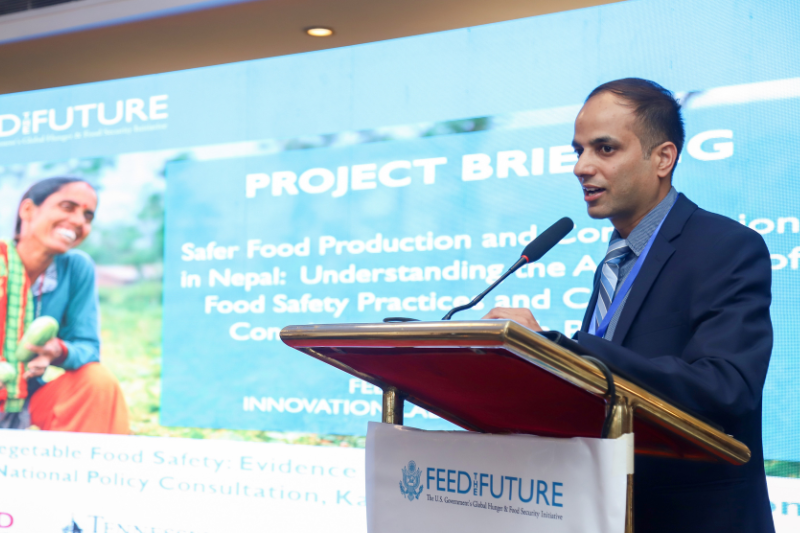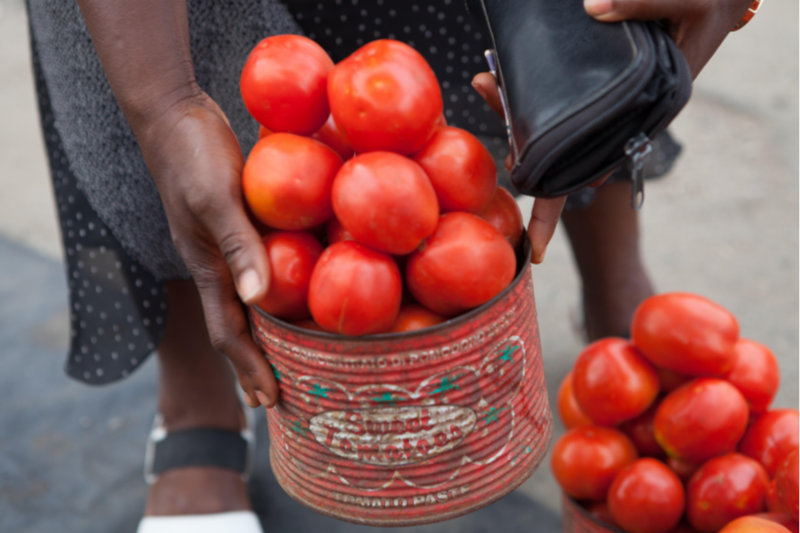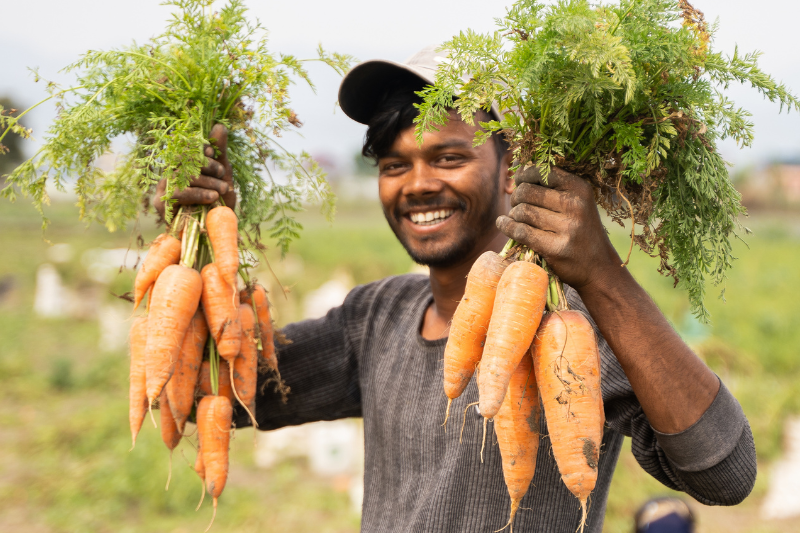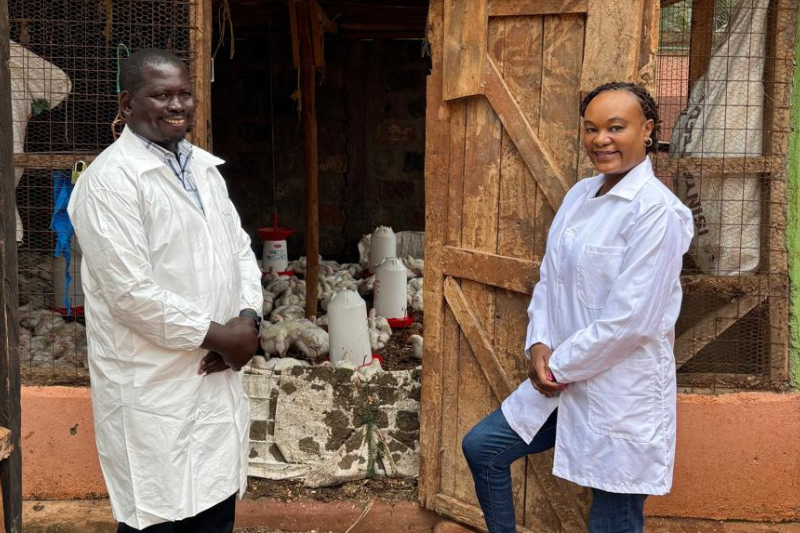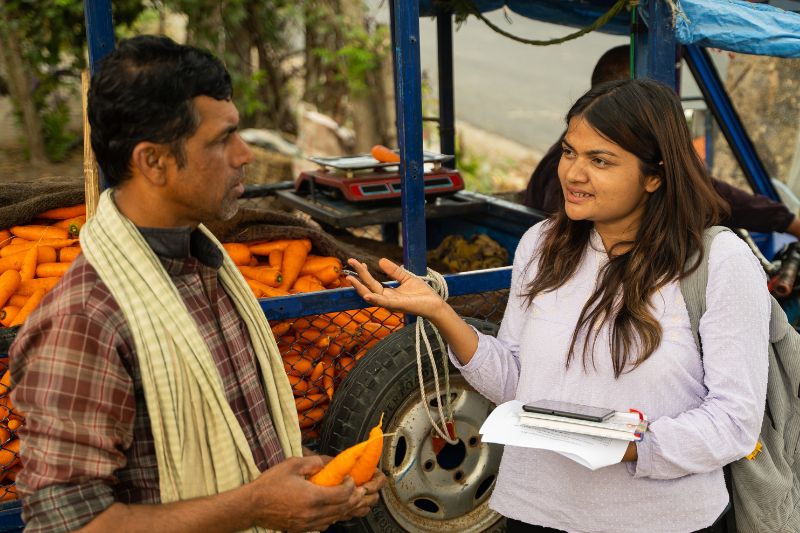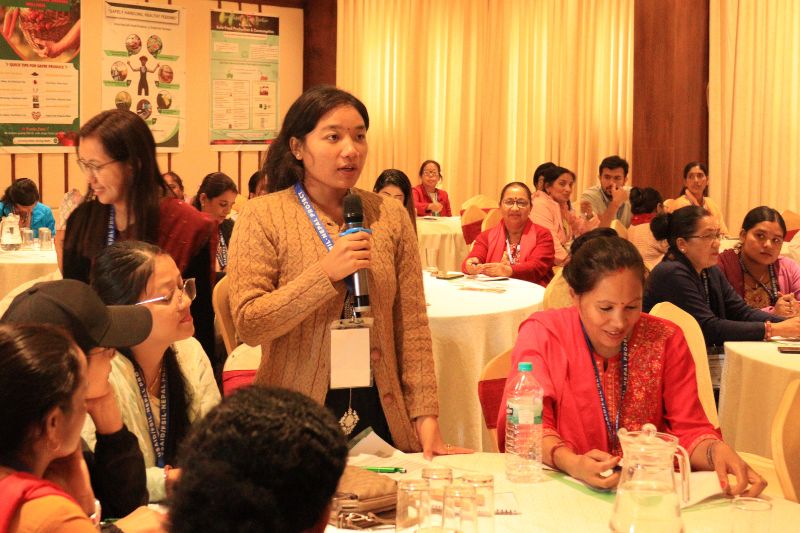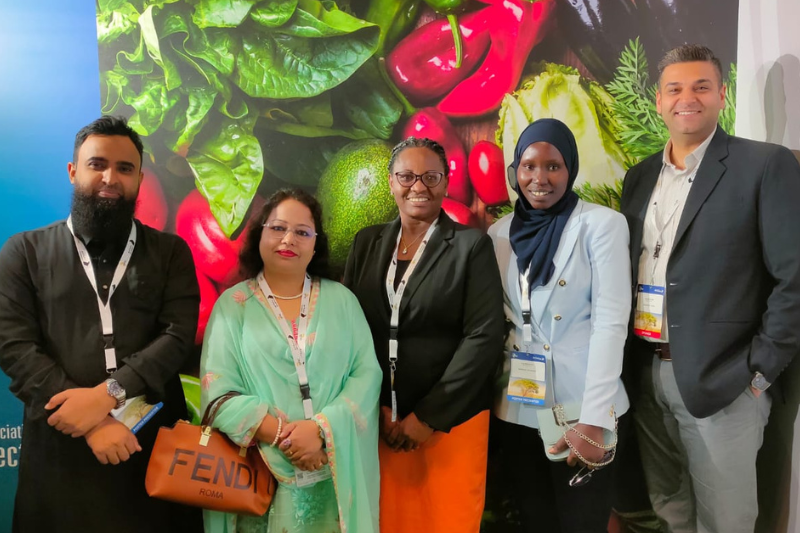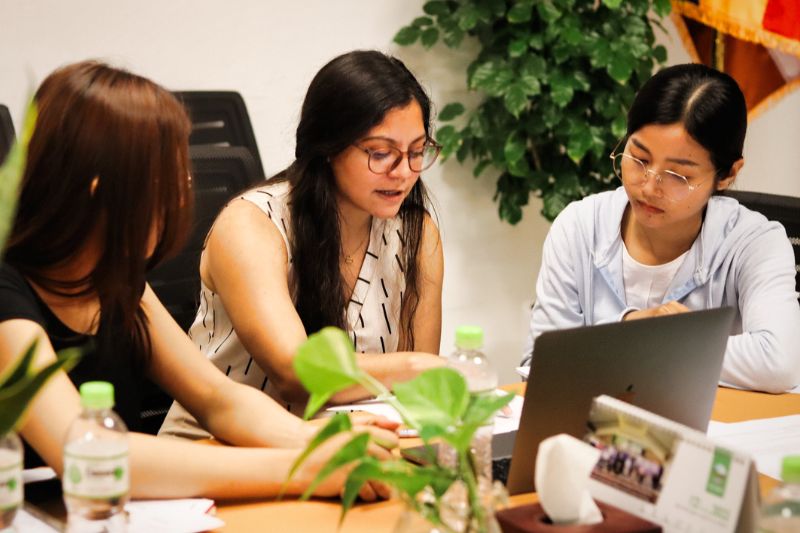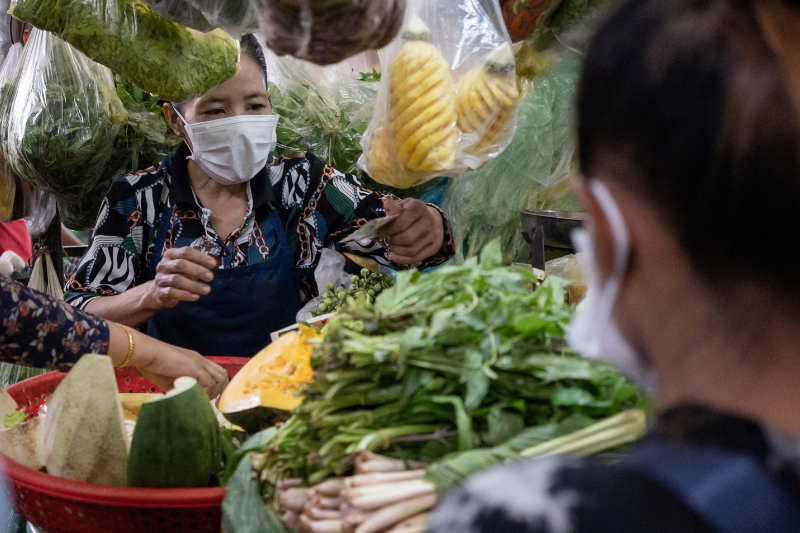Posted on July 1st, 2024 in Program Updates
In April, more than 135 food system stakeholders gathered in Kathmandu for a national policy consultation to discuss opportunities to strengthen produce safety in Nepal. The group’s recommendations were captured in a draft resolution which will be shared with the government representatives charged with developing strategies to implement a new, more stringent food safety law.
“Food safety is pivotal to building a sustainable food system in Nepal and supporting a well-nourished population,” said Aditya Khanal, associate professor and agricultural economist at Tennessee State University. “And while Nepal has enacted numerous policy initiatives to strengthen food safety systems, microbial foodborne pathogens—particularly in fruits and vegetables—have received less attention than chemical contaminants and physical hazards.”
Continue reading on Agrilinks
Posted on June 28th, 2024 in Program Updates
In Nigeria, foodborne illness is a significant public health issue, causing over 200,000 deaths a year and contributing to a childhood stunting rate of 37 percent in children under the age of five. To develop strategies to address food safety at the household level, researchers funded by the Feed the Future Innovation Lab for Food Safety (FSIL) are working with citizen scientists to understand the challenges mothers face in providing safe, nutritious meals for their families.
“Exposure to unsafe food in the household through inappropriate food storage, cross-contamination, and the presence of an infected food handler may create a vicious cycle of diarrheal illness that threatens the nutritional status of the most vulnerable, especially infants and young children,” said Abiodun Atoloye, assistant professor of nutrition science at Utah State University and a FSIL Nigeria project co-PI.
Continue reading on agrilinks
Posted on June 19th, 2024 in Program Updates
The production of safe fruits and vegetables requires farmers to manage potential sources of foodborne pathogens, from keeping uncomposted or raw manure out of fields where crops are being sown to washing produce in clean, uncontaminated water at harvest. In Nepal, demand for fresh produce has been rising due to an increased awareness of its nutritional benefits. Growers and extension agents now have a new resource to understand the risks and steps they can take to safeguard fruits and vegetables: a grower’s manual created by a project funded by the Feed the Future Innovation Lab for Food Safety.
Safeguarding fruits and vegetables from foodborne pathogens can seem like a daunting proposition. Contamination can occur at any stage from farm to table—from sources including animal feces in the field, irrigation and wash water, harvesting containers, or infected workers—and it can lead to serious foodborne illnesses.
Continue reading on Agrilinks
Posted on June 3rd, 2024 in Program Updates
Kenyan researchers are leading an effort to strengthen food safety practices among the small and midsize poultry enterprises that feed Nairobi’s growing population. With foodborne illness estimated to cost the Kenyan economy one billion U.S. dollars annually, addressing food safety in the poultry sector is an important focus due to the impact of foodborne disease on public health, the economic costs arising from lost productivity and medical treatment, and the implications for food security and economic opportunity.
“In Kenya, where undernutrition rates are high and the population-environment balance is delicate, the poultry value chain plays a very crucial role in addressing hunger and poverty towards the United Nations’ first two Sustainable Development Goals: No Hunger and Zero Poverty,” said Professor Catherine Kunyanga, associate professor and associate dean at the University of Nairobi, who serves as co-lead PI for the project with Dr. Robert Onsare, Principal Research Scientist and Acting Deputy Director for the One Health Approach Research Program at the Kenya Medical Research Institute. “Poultry business has recently been picked up by women and youth in most parts of the country as a quick source of income and livelihood for many households because it is profitable and provides a good source of animal-based protein that assures households’ nutrition security in Kenya.”
Continue reading on Agrilinks
Posted on March 25th, 2024 in Program Updates
When Rita Gurung was a graduate student in India, she witnessed her male friends finding paid research fieldwork positions and wondered what cultural assumptions about women’s aptitude or suitability for fieldwork were limiting her access to these opportunities.
“Professors and project leaders routinely excluded female students from fieldwork because they thought they couldn’t safely send the women alone in rural areas or that their efficiency would not be on the same level as the men,” said Gurung.
Continue reading on agrilinks
Posted on March 18th, 2024 in Program Updates
Nepal’s government is promoting the production and consumption of fresh produce to alleviate food and nutritional insecurity in the country. However, inadequate food safety practices can jeopardize the intended benefits of eating more nutrient-dense fruits and vegetables. To promote the adoption of food safety practices within Nepal’s fresh produce systems, a project funded by the Feed the Future Innovation Lab for Food Safety (FSIL) recently trained more than 240 farmers and extension workers through five produce safety workshops held in produce hubs across the country.
“Food safety is an emerging issue in government policy, but stakeholders in fresh produce systems still have low awareness,” said Aditya Khanal, associate professor in the Department of Agricultural Business and Education in the College of Agriculture at Tennessee State University and leader of the project Market-led food safety in Nepal: Harnessing production incentives and consumer awareness. “Awareness among stakeholders involved in fresh produce systems – such as growing, handling, and consuming the fresh produce – is highly important.”
Continue reading on Agrilinks
Posted on March 13th, 2024 in Program Updates
Researchers from Bangladesh, Nigeria, and Senegal sponsored by the Feed the Future Innovation Lab for Food Safety (FSIL) converged at the International Association for Food Protection 17th Dubai International Food Safety Conference. The gathering of more than 3,000 experts from local, regional, and international organizations provided the team with opportunities to share their work, expand their professional network, and learn about the latest advancements in food safety.
FSIL-sponsored researchers in attendance included Shahida Akhter D.V.M., a Ph.D. fellow at Bangladesh Agricultural University; Md. Farid Dewan, a Ph.D. Fellow at Bangladesh Agricultural University and Assistant Professor at Noakhali Science and Technology University; Maroky Diedhiou, an agricultural engineer at Senegal’s National Higher School of Agriculture of Thiès; and Dr. Nkem Torimiro, an Associate Professor and research scientist at Obafemi Awolowo University, Nigeria.
Continue reading on Agrilinks
Posted on February 28th, 2024 in Program Updates
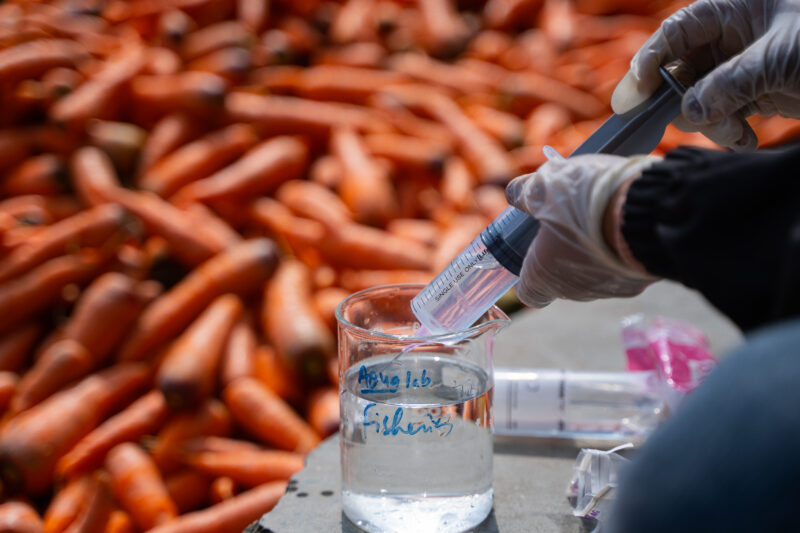
Photo Credit: Kathacharya Productions
A splash of irrigation water in a field, a rinse at the market, a thorough wash of salad vegetables before a meal: all three are moments when water contaminated with foodborne pathogens can turn nutrient-rich produce into a vehicle for foodborne illness. A nationwide study of contamination in the water sources used by growers, vendors and consumers in Nepal underscores the pressing need for policies and programs to increase the safety of water used in Nepal’s food systems.
“It is important for dietary diversity and nutrition to consume fresh produce, but raw produce poses a risk of foodborne illnesses,” said lead author Aditya Khanal, associate professor in the Department of Agricultural and Environmental Sciences at Tennessee State University. “Identifying barriers to fresh produce safety, such as water quality, can inform policies and investments to reduce foodborne illness.”
Continue reading on Agrilinks
Posted on February 21st, 2024 in Program Updates
Dissemination of research results is a pathway to impact, and findings published in an English-language journal can reach a global audience. Publishing can be especially challenging, however, for researchers who aren’t fluent in English or are new to the peer-review process. A project funded by the Feed the Future Innovation Lab for Food Safety recently held a scientific writing workshop specifically designed to support Cambodian students in communicating their research.
“If your target audience is local, you can choose a journal that uses the local language, but the ones published in English have a broader audience, so publishing your article in a journal written in English provides you the opportunity to reach more people,” said Ellen Mendez, a Ph.D. candidate in the Department of Animal Sciences and Industry at Kansas State University. “It all depends on the objectives of the research and who you want to reach with the publication.”
Continue reading on Agrilinks
Posted on December 14th, 2023 in Program Updates
Vegetables play a key role in the Cambodian diet, but these nutrient-dense foods are also a common source of foodborne illness. Farms and informal markets, one of the main sources of produce for many Cambodians, are key points for preventing contamination with foodborne pathogens. To develop tailored outreach programs to promote the adoption of new food safety practices, researchers funded by the Feed the Future Innovation Lab for Food Safety (FSIL) conducted surveys to better understand current perceptions about foodborne illness — including its health impacts and where contamination occurs — among growers and vendors working with informal vegetable markets. They identified crucial gaps in knowledge about microbial food safety risks and health impacts.
Continue reading on Agrilinks
